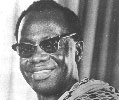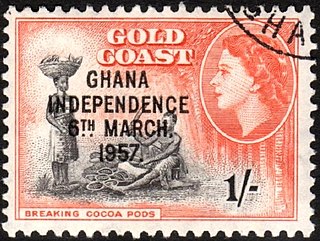Related Research Articles

Ghana, officially the Republic of Ghana, is a unitary country in West Africa. It lies adjacent to the Gulf of Guinea and the Atlantic Ocean to the south, sharing a border with Ivory Coast in the west, Burkina Faso in the north, and Togo in the east. Ghana covers an area of 239,567 km2 (92,497 sq mi), spanning diverse ecologies, from coastal savannas to tropical rainforests. With nearly 35 million inhabitants, Ghana is the second-most populous country in West Africa. The capital and largest city is Accra; other significant cities include Kumasi, Tamale, and Sekondi-Takoradi. In 1957 Ghana became the first colony in Sub-Saharan Africa to achieve sovereignty, under the leadership of Kwame Nkrumah.

Francis Kwame Nkrumah was a Ghanaian politician, political theorist, and revolutionary. He served as Prime Minister of the Gold Coast from 1952 until 1957, when it gained independence from Britain. He was then the first Prime Minister and then the President of Ghana, from 1957 until 1966. An influential advocate of Pan-Africanism, Nkrumah was a founding member of the Organization of African Unity (OAU) and winner of the Lenin Peace Prize from the Soviet Union in 1962.

Kofi Abrefa Busia was a Ghanaian political leader and academic who was Prime Minister of Ghana from 1969 to 1972. As a leader and prime minister, he helped to restore civilian government to the country following military rule.

The Parliament of Ghana is the unicameral legislature of Ghana. It consists of 276 members, who are elected for four-year terms in single-seat constituencies using a first-past-the-post voting system.

The prime minister of Ghana was the head of government of Ghana from 1957 to 1960 and again from 1969 to 1972.
The United Gold Coast Convention (UGCC) was an early nationalist movement with the aim of self-government " in the shortest possible time" founded in August 1947 by educated Africans such as J.B. Danquah, A.G. Grant, R.A. Awoonor-Williams, Edward Akufo Addo, and others, the leadership of the organisation called for the replacement of Chiefs on the Legislative Council with educated persons. whose aim was to bring about Ghanaian independence from their British colonial masters after the Second World War. The United Gold Coast Convention appointed its leaders to include Kwame Nkrumah, who was the Secretary General. However, upon an allegation for plans against Nkrumah's leadership, he was arrested and jailed. The UGCC leadership broke up and Kwame Nkrumah went on a separate way to set up the Convention People's Party (CPP) for the purpose of self-governance. The UGCC was founded in Saltpond.
Alhaji Imoru Egala was a Ghanaian politician and educationist. He held various positions in government in the Gold Coast and after independence of Ghana. He was the foreign minister of Ghana in the First Republic between 1960 and 1961.

Parliamentary appointments were scheduled to be held in Ghana on 9 June 1965. As the country was a one-party state at the time, no parties except President Kwame Nkrumah's Convention People's Party (CPP), were allowed to participate. The CPP's central committee nominated 198 candidates for the 198 seats in the National Assembly, who were then declared elected without a vote taking place.

Honourable Samia Yaba Christina Nkrumah is a Ghanaian politician and former chairperson of the Convention People's Party (CPP) making her the first woman to ever head a major political party in Ghana. In the 2008 parliamentary election, she won the Jomoro constituency seat on her first attempt. She is the daughter of Osagyefo Dr. Kwame Nkrumah, the first President of Ghana.

Ghana gained independence from the British on 6 March 1957. It is a member of the Commonwealth of Nations. The country became a republic on July 1, 1960.
2006 in Ghana details events of note that happened in Ghana in the year 2006.
1970s in Ghana details events of note that happened in Ghana in the years 1970 to 1979.
1950s in Ghana details events of note that happened in Ghana in the years 1950 to 1959.
Real Republikans was a Ghanaian association football club based in the capital, Accra, along with Hearts of Oak, and was among the most successful Ghanaian clubs in the country’s first decade of independence. It holds Ghana's record for the most consecutive FA Cup wins, four. The club formed the core of the national team, the Black Stars, in its early years.
Founders' Day is a national public holiday observed to commemorate the contributions of all the people, notably the "Big Six" who led the struggle for Ghana's independence. The Founder's Day was formerly called "Founder's Day" with the letter "S" appearing after an apostrophe and it was celebrated to earmark the achievements of Osagyefo Dr. Kwame Nkrumah.

The Independence Day of Ghana is a national holiday celebrated yearly. This day is an official state holiday for the citizens of Ghana both within and in the diaspora to honour and celebrate the Heroes of Ghana who led the country to attain its independence. The Independence Day is celebrated on March 6 every year. Independence Day is also remembrance of the day that marks the declaration of Ghanaian independence from the British colonial rule. The first Prime Minister of Ghana, Kwame Nkrumah, became the Head of Government from 1957 to 1960. On Wednesday, 6 March 1957 Kwame Nkrumah declared to the people of Ghana about their freedom, he added that, "the African People are capable of managing their own affairs and Ghana our beloved country is free forever." Ghana was the first country in sub-Saharan Africa to achieve its independence from European colonial rule. Many Ghanaians who have had the opportunity to serve as president have remembered the occasion and made Ghana Independence Day a public holiday to celebrate. Granting the day as a national holiday is well recognized such that, if 6 March of a year fell on a weekend of the Independence Day celebration, the working day that follows which is a Monday will be granted and observed as a holiday by the whole nation. Many Presidents from other African countries and Europe have been invited to Ghana to join in the celebration either as Guest Speakers or Invited Guests since the reign of former President Kwame Nkrumah till now.
Lord Oblitey Commey is a Ghanaian administrator, entrepreneur and politician. He is a member of the New Patriotic Party and the current Director of Operations at the Jubilee House, the official residence and office of the President of Ghana. He has served as an executive member of Accra Hearts of Oak Sporting Club and is a former youth organizer for the New Patriotic Party.
Henry Sonnie Torgbor Provencal (1922–2007) was a Ghanaian politician. He was a member of parliament and a minister of state during the first republic. He served as the member of parliament for the Accra Central constituency from 1960 to 1965 and the member of parliament for the Gamashie constituency from 1965 to 1966. He also served as the Regional Commissioner for Greater Accra from 1965 to 1966.

The Political history of Ghana recounts the history of varying political systems that existed in Ghana during pre-colonial times, the colonial era and after independence. Pre-colonial Ghana was made up of several states and ethnic groups whose political system was categorized by 3 main administrative models; Centralized, Non-centralized and Theocratic states. In the colonial era, the British Empire employed different forms of government among its four territorial possessions in the Gold Coast. Indirect rule was implemented in the late 19th century after its success in Northern Nigeria. From the 1940s, native Ghanaians yearned for more autonomy. This resulted in the several constitutional reforms as well as the creation of the office of the Prime Minister in 1952.
References
- ↑ "Ghana profile". www.bbc.co.uk. Archived from the original on 22 June 2011. Retrieved 18 May 2011.
- ↑ "The Country Ghana". www.ghanaweb.com. Archived from the original on 16 May 2011. Retrieved 21 May 2011.
- ↑ "The National Liberation Council and the Busia Years". www.ghanaweb.com. Archived from the original on 16 May 2011. Retrieved 21 May 2011.